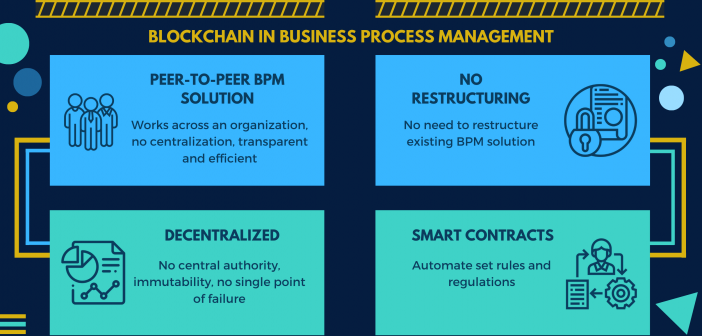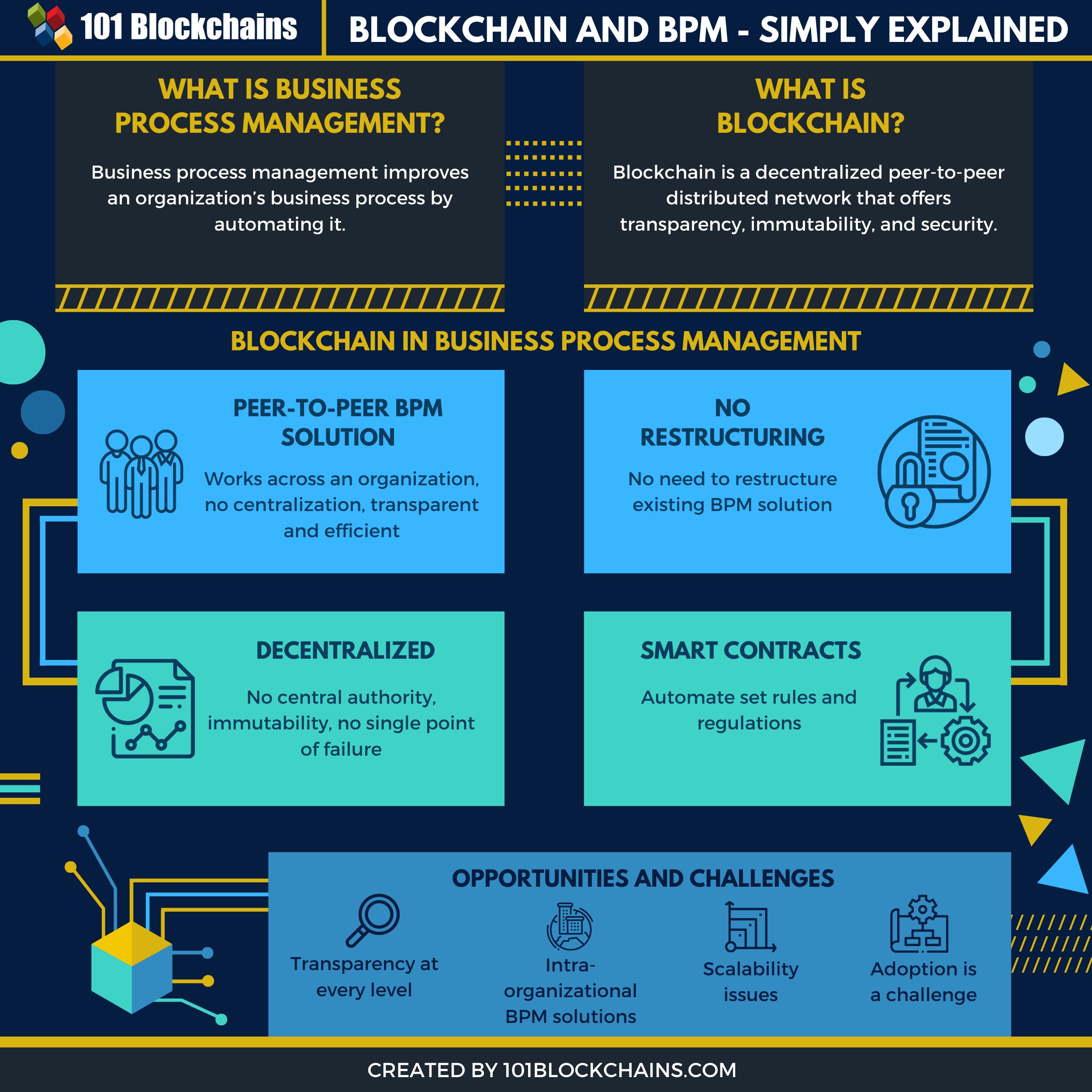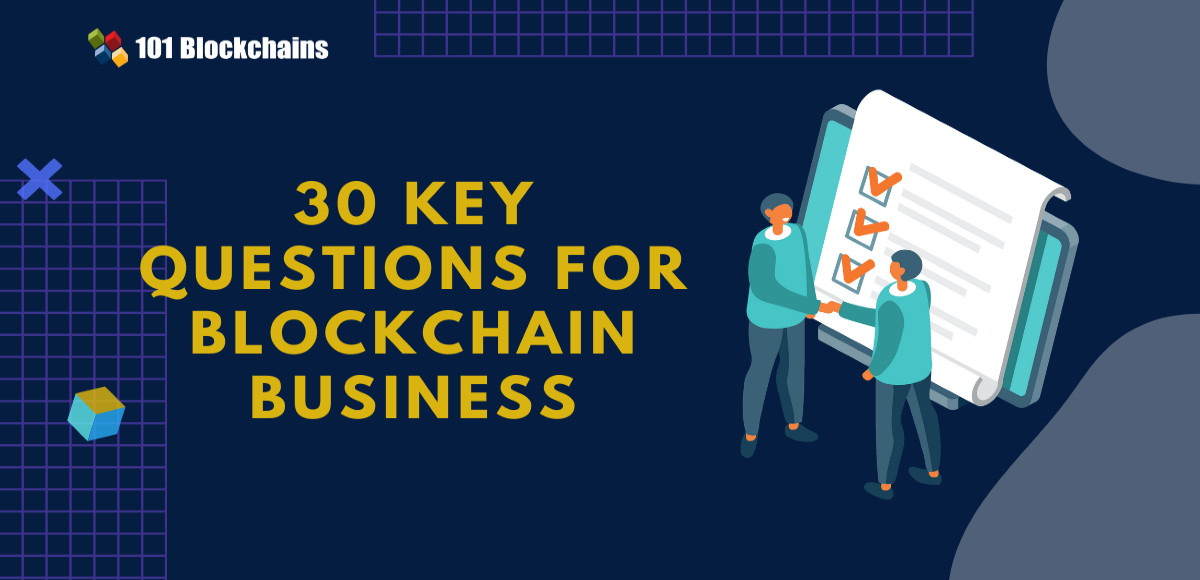Learn how blockchain truly works, master key definitions, and uncover what makes smart contracts so "smart." Dive into the fundamentals, gain valuable insights, and start your blockchain journey today!

- Opinions
101 Blockchains
- on February 09, 2020
BPM and Blockchain In 2020 and Beyond
Will blockchain change business process management(BPM)? Let’s find out in our article where we discuss BPM and blockchain and how both of them work together to make a better solution for businesses.
Right now, we have emerging technologies that are going to change how old solutions work. Take BPM for instance. BPM is all about business processes — on how they work, execute, get designed and improve. Every organization is now looking for breakthroughs to improve every aspect of their work process, which include improving their own solutions such as BPM.
This article is now about blockchain vs BPM.
What is Business Process Management?
Before we dive deep into BPM and blockchain, let’s look into business process management.
Business process management takes care of all the organization’s business processes, automating them. It is a system that ensures that the processes that working in organizations are effective in their approach. It is a way to automate and systemize the intra-organizational processes.
BPM comes with its own set of challenges. For instance, there is always a lack of trust within the system. Also, there are too many challenges when it comes to establishing the inter-organizational BPM solution.
What is Blockchain?
Blockchain is a decentralized peer-to-peer network where each peer keeps a copy of the ledger. It is a decentralized network that doesn’t rely on a central authority. This simple idea brings innovation to the table. Its key features include immutability, transparency, and security.
Read more about Blockchain here: Blockchain for Beginners.
Blockchain can change how both inter and intra-organizational BPM works. The trustworthiness of blockchain technology makes it an ideal network candidate to run the BPM solution where it solves the trust issues among peers. All the transactions that are carried out by the BPM solution are verified using the consensus method implemented by the blockchain network. The consensus works great as it also makes sure that the nodes work towards making the network work.
How Blockchain is going to change Business Process Management
The idea of a transparent immutable network brings a lot of options for business out there. With a fast-changing market, it is important for businesses to be as transparent as possible without the need to give up crucial information.
Peer-to-Peer BPM solution
With blockchain, BPM can surely work effectively and also help organizations to reduce cost. Blockchain for Business process management software is an ideal solution to improve transparency, authenticity, and informational flow. In the end, the BPM system evolves into a peer-to-peer BPM solution that can work across organizations. It offers a better value proposition and also ensures that the shareholders can work together in an efficient manner.
The current pain points of BPM include trustworthiness and efficiency. Blockchain solves these two pain points by acting as a communication layer for the BPM software. Not only that, but it can also help different parties to work through the regulatory guidelines and implementing BPM across organizations.
No restructuring
Another aspect that organizations will see is that they would not require to drastically re-structure or change their workflow process to use Blockchain on the BPM solution. This means there is no new platform that requires new training and infrastructure. Blockchain provides enough value in BPM solutions to be considered. Not only it provides value for the inter-organization BPM, but it also makes it possible to have an efficient and cost-effective intra-organization BPM solution. Hence, Blockchain-based BPM doesn’t require any restructuring
Removal of Centralized Entity
The biggest change is the removal of a centralized entity. This removes the third party BPM solution provider limitations out of the way. This means the data cannot be locked by a third-party provider and you are the sole owner of all the data generated by your organization and the related parties. The resilience problems are also solved with the use of blockchain in BPM as there is no single point of failure.
Smart Contracts
Smart contracts also play a crucial role in making BPM. It benefits enterprise collaboration by building a decentralized network that is automated with the help of smart contracts. By using smart contracts, companies can define the conditions through which information or assets can be exchanged or transferred. This enforces a rule in the system and ensures that the parties are following the rule-set across the network. It also means the integrity of the workflow is maintained at all times. In the end, smart contracts help ensure transparency, trust, and security among the users of the network.
Another benefit of using smart contracts is real-time auditing for workflows and processes. The real-time auditing helps to keep the system efficient and also iron out any issues if found.
BPM Lifecycle and Blockchain
To get a better understanding of blockchain impacts on business process management, let’s go through the BPM lifecycle framework and see how blockchain impacts each phase.
Identity
One of the first steps in BPM is process identification. Right now, companies utilize an inward-looking perspective to find out the process. Blockchain can improve the whole process identification by evaluating key terms associated with the process, including its strengths, weakness, threats, and opportunities. The best approach is to do the right research and find out processes that have the right affinity to blockchain and can benefit from it.
Discovery
Next comes process discovery in which the goal is to find more information about a process, including how it process and its representation similar to the as-is process model.
Right now, businesses find out about the process by doing a plethora of activities, including walkthroughs, interviews, documentation analysis, and so on. On top of these, some automation techniques are also used. All of these can be changed with blockchain as it can help better data gathering and fragmentation.
Analysis
In the analysis phase, the issues in the business process operations are accessed. To do it, the data present within the organization, including both internal and external, are utilized. It is a good idea to run the process on blockchain and then extract data from there. This gives a good estimate of how the process will work with BPM powered by blockchain. The information gathered can also help detect more issues with the process and help discover other processes.
Redesign
In the redesign phase, the processes are improved systematically. To do so, organizations use redesign heuristic build. But, with blockchain, new novel ways of improving processes can be achieved. For example, including an external player can improve the process if it is automated using smart contracts. There are many permutations and combinations that need to be accessed and thought upon when blockchain is in play.
Implementation
The biggest impact of blockchain in BPM can be seen in the implementation phase. In this process, the model is transformed into a software code. Blockchain can help with the transition as it can give a better context on how the code should function when implemented. There are, of course, challenges when it comes to implementing BPM on the blockchain. One of those challenges includes the definition and identification of abstraction.
Execution
Lastly, blockchain can also help in the execution by improving efficiency, transparency, and security. For instance, blockchain can instantly notify the administrator if there is a need for attention. Smart contracts also help to automate the whole system.
Monitoring
Finally, monitoring is surely impacted by blockchain as it helps in real-time analysis of the BPM solution installed in an inter or intra-organization setting.
Opportunities and Challenges
Adoption is one of the biggest challenges among the organization. Currently, the traditional BPM solutions are integrated deeply into the companies which makes them hard to upgrade or change. Other than adoption, another challenge is the blockchain itself. Blockchain is an emerging technology which means that implementing it into an evolving workflow is a risky endeavor.
The supply chain is one of those sectors that will benefit immensely with the integration of blockchain technology. It can help automate it and also benefit from connected BPM solution that is also powered by technology.
The biggest opportunity is the introduction of a peer-to-peer RPA system which brings in the ability of an intra-organizational RPA system. It makes it easy for multiple organizations to share information without worrying about security, resilience, and immutability.
Conclusion
This leads us to the end of our Business Process Management and Blockchain. Do you think that BPM and blockchain work together? Comment below and let us know.



![Future of Blockchain: Predictions for 2022 [UPDATED] future of blockchain predictions](https://101blockchains.com/wp-content/uploads/2020/12/future-of-blockchain-predictions.png)

